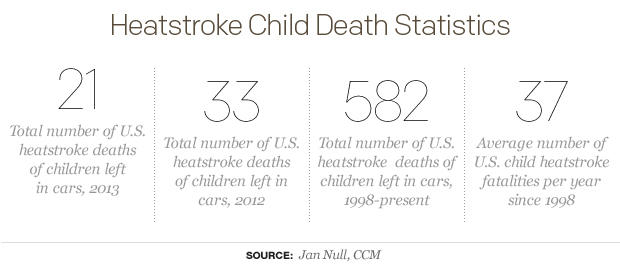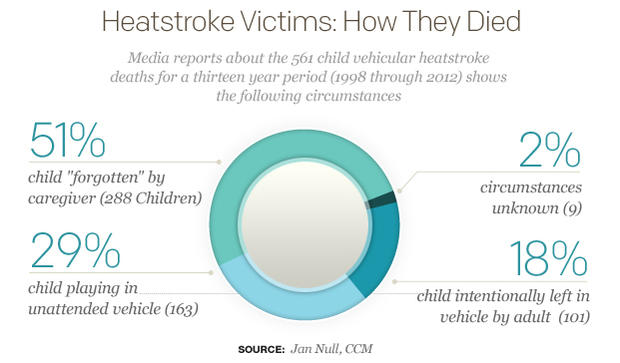11-month-old dies after being left in car; 21st this year in U.S.
An 11-month-old in Alabama is the 21st child victim this year to die of heat stroke after being left in a car. The baby girl was left for approximately three hours in her parents' vehicle Wednesday.
Her body temperature when found was 105 degrees, according to local police.
- Heat wave continues to stifle large swath of U.S.
- How to stay cool during a sweltering heat wave
- Keep your pets cool during the summer weather
Jenny Stanley, a mother of three, is all too familiar with the pain of losing a child to hyperthermia, the medical term for heat stroke.
On August 22, 2010, her daughter Sydney climbed into the family's parked car and became trapped inside the vehicle. The family thought she was at the neighbor's house playing with her friend.
When Sydney was finally found by Jenny's husband, Mike, it was too late. Paramedics on the scene were unable to resuscitate her. She was six years old.
Stanley now dedicates her time working with Safe Kids and the General Motors Foundation, making other parents aware of the dangers of unattended children in cars.
"I just remember walking in the door and seeing her laying in the foyer, lifeless, and I just remember screaming at them, 'You're a medic. Don't stop, please just don't stop!'" said Stanley.
"I think the heat overtook her, and she just couldn't get out," said Stanley. "She just became disoriented, and just couldn't think of what to do and my husband found her in the backseat, on the back floorboard in a fetal position."
Jan Null, a meteorologist at San Francisco State University, has been studying child deaths in cars from hyperthermia for over a decade.
"Children get access to the car. They climb in the car to play hide-and-go-seek, or to read, or to find a quiet place and they get overcome by the heat," said Null.
"Their body temperature rises three to five times faster than yours or mine would. So we can sit in a car that's 120 degrees. We would not be comfortable, we would get sweaty and miserable and ill, in a fairly short amount of time, in half-an-hour. But an infant or a child, if they're not properly hydrated, they could develop heat stroke and possibly die in significantly less time than that," said Null.
On a warm, summer day, temperatures in cars go up 19 degrees in the first 10 minutes, according to Null. January is the only month a child has not died from heatstroke in a car in the U.S.
"The heat is coming through the glass in your car, it's heating up your dashboard, your seat, and it's heating up to the point where on summer days 200 degrees for a dashboard temperature is not uncommon," said Null.
"Cars, being a closed system just like a greenhouse, heat up very rapidly and they don't cool down," he added.
On average, 37 children die in the U.S. per year from heatstroke from a car.
Nulls' research shows that circumstances surrounding the deaths are mostly caregivers saying they "forgot" the child (51 percent). The next most common circumstance of death children playing in an unattended vehicle (29 percent).
"People will forget the child is in the back of the car, or they think the other parent is going to get the child out of the car ... or cases where a child is supposed to be dropped off at daycare and the caregiver kind of just spaces out. Happens to all of us, you know I've missed my exit on the freeway," said Null.
Stanley's advice is to first of all, never leave a child in the car, even if running an errand that you will think will take a minute.
Next, she advises parents to create reminders and put something next to the child that you're going to need at your next stop, such as your briefcase, your purse, or a laptop.
Finally, call 911 immediately if you see a child alone in a car.
"Another thing I tell my friends is, we tell our kids don't play with the horn, but my friends teach their kids to lay on the horn, practice it, just lay on the horn till help comes, it's OK when there's an emergency," said Stanley.
She also tells parents to get into the car with their children and lock themselves in, and practice how to get out, whether it be climbing to the front seat or pulling a lock up.
"If I can save one child, then I'm doing something to help the situation. Not that anything will ever justify what happened or make me understand what happened," said Stanley.


